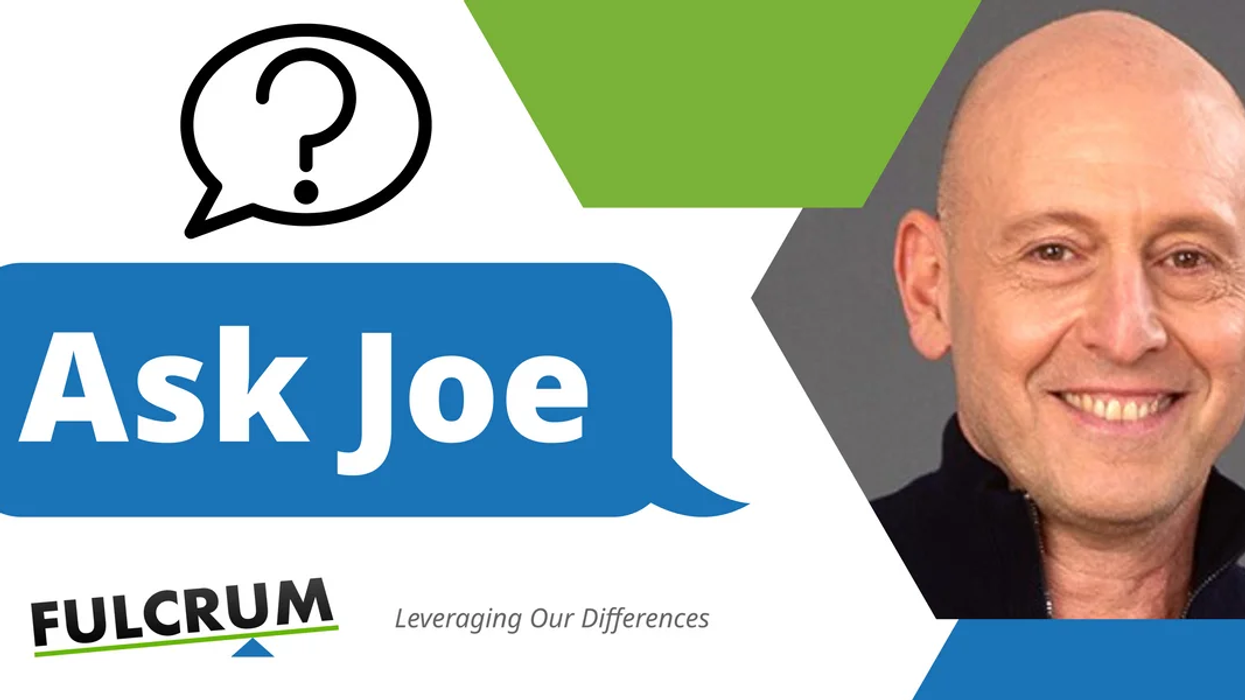Hi Joe,
I have a question that is more personal and not about societal change. I hope it’s ok to ask. I have a boss who shuts me down at meetings. He tends to let everyone else finish what they are saying (most of the team are men), but it seems when I share something, he loses patience.
I don’t know if he’s aware of it. I don’t know if I’m being paranoid. Should I say something? All I know is that I want to quit.
Any suggestions?
Shut down
Hello Shut Down,
First of all, yes! This is the right place for asking more specific personal questions around the themes of communication, conflict, relationship building and self-care, as well as larger issues.
I’m sorry to hear you are experiencing that and I hope I can offer some insights. Since I’m not getting the full context, nor your boss’s perspective, I can only respond based on your version of the story. That isn’t to imply that you might not be telling the truth; it’s simply acknowledging that it is virtually impossible for any of us to give a 100 percent accurate depiction of any issue or situation.
This is a common situation we often discuss in the world of leadership development. The overall reasons why someone may leave their job is not necessarily that they don’t like their work, but that they are unhappy with management or don’t feel valued. In my trainings on Resilient and Inclusive leadership, I quote former Secretary of the Treasury, Paul O’ Neill: “Human beings have discretionary energy, and they would give it to you if you treat them with dignity and respect.”
In other words, when people feel valued and are acknowledged for the contributions they are making, the more likely they will invest more in the health and success of the organization. In order to create a work environment that is thriving, attention has to be paid to creating more safety and trust.
I bring this up as a way to set up how you might consider approaching your boss, Shut Down. The first thing to consider is would you feel safe discussing this with him? If not, then perhaps you can ask someone to join you in this conversation as support. Or you may conclude that this is not the best environment for you to feel satisfaction or fulfillment in your work.
If you decide to talk with him, ask yourself what your desired outcome would be. This is important because oftentimes we think we are going into these conversations with the best intentions for win-win solutions, but the wounded, unconscious parts of us just want the other to hurt in some way. This never leads to beneficial outcomes. Before you draw your conclusions, do an objective examination of the situation.
What is true in this situation is that you notice that he cuts you off when you are speaking. Until you ask, you don’t know for a fact what his intentions are. Is he purposefully shutting you down? Or is it an unconscious pattern that he does with all women? Is it a coincidence that he is doing it to you, a woman? Does he do it with others? And I would suggest you also take a moment to consider that maybe you are taking up too much of the meeting with your words? I’m not placing blame; I’m acknowledging the importance of delineating what is fact and what is interpretation, or accusation, or judgment.
I believe that it is impossible, and even aggressive, to try to change people, but you can support them, with patience and compassion, to modify their behavior. So, when you speak to him, I would suggest sticking to what can be verified and name the behavior: you notice when you are talking in meetings, that he cuts you off. Then give him a chance to respond. It is in this moment that you get a lot of important information. Based on his reaction, you will see if he is aware of his actions, or if he gets defensive or immediately apologizes, to name a few.
After this initial response, you will have an idea of how to proceed in the conversation. If he is still willing to hear your truth, then share with him how this behavior impacts you. You’ve already named it: you feel shut down. After sharing this, once again, give him a chance to respond.
If he is still open to hearing your truth, then let him know what you would need in these situations to feel empowered. If you didn’t feel shut down, what would you feel instead? And what would you need to feel this new way? Maybe inquire what your boss might need in these situations as a way to show interest in supporting him in shifting his behavior? By both of you expressing your needs, and both of you working together to help each other get your needs met, you create the space for new win-win solutions, feeling valued and respected.
This sounds easier than it is, Shut Down. My hope with my response is to support you in starting your process of analysis which could lead to some clarity on what your best options and actions could be for this situation.
Honor your authentic voice,
Joe
Learn more about Joe Weston and his work here. Make sure to c heck out Joe’s bestselling book Fierce Civility: Transforming our Global Culture from Polarization to Lasting Peace, published March 2023.
Have a question for Joe? Send an email to AskJoe@fulcrum.us.




















Marco Rubio is the only adult left in the room